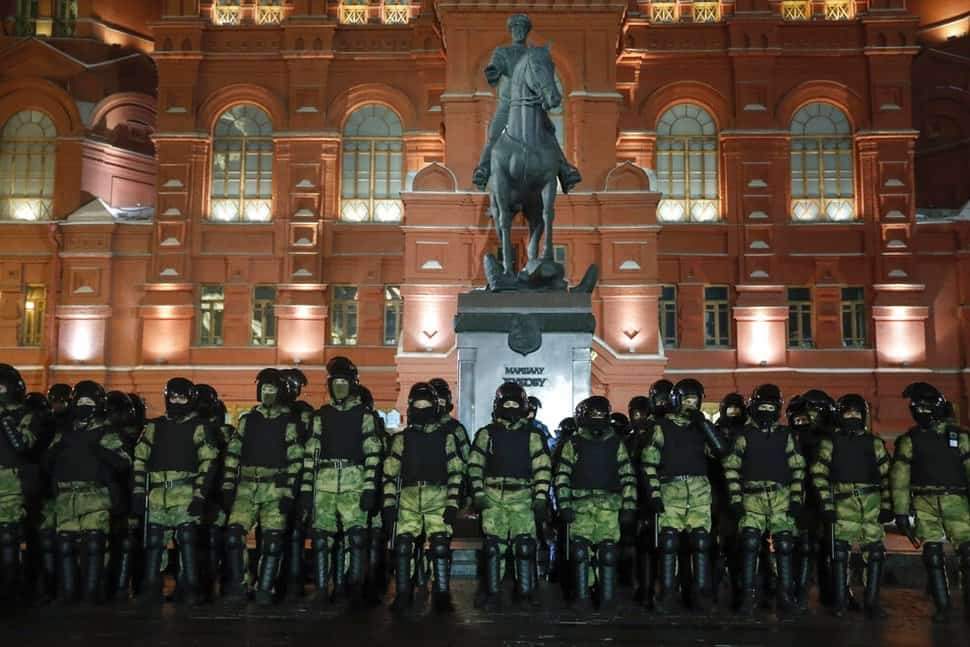U.S. ‘Very Concerned’ Putin Will Provoke Foreign Crisis to Quell Pro-Navalny Unrest

THE TOP U.S. MILITARY official for Europe on Wednesday expressed concern that Russian President Vladimir Putin may attempt to spur another crisis abroad as a way to distract from the mounting political pressure at home – a fear analysts say has become all the more potent as supporters of now-imprisoned dissident Alexei Navalny set their sights on the Russian leader's control over the levers of power.
"This adventures abroad is something that we pay close attention to. And obviously with what is unfolding as we speak with respect to the Navalny case, we're very concerned about that," Air Force Gen. Tod Wolters, chief of U.S. European Command, said Wednesday morning. "Russia has some tendencies to be a little adventurous in times like this, and at other times they have tendencies not to."
Russia invaded northern Georgia in 2008 as it faced an economic recession at home. Amid another financial crisis beginning in 2014, Putin's government again focused abroad, first in Ukraine and later in Syria.
Analysts say Putin saw the moves as a way to secure what he considered to be Russia's position as a global decision-maker while also bearing out his vision for his own country: one with a military rebuilt to its former Soviet glory and fueled by prideful Russian nationalism. But the interventions have, more importantly, helped Putin distract the Russian people from dramatic federal measures – including painful cuts to pension benefits among other hardships Russians have had to endure in recent years.
Now, mobs of federal riot police have mobilized to shut down city streets in Moscow. Late Tuesday, they had to protect the Kremlin from a swell of Navalny supporters moments after a Russian court sentenced him to years in a prison camp on what his legal team considers trumped up charges. The protests come after thousands were arrested in sweeping unrest across the country in support of Navalny's attempts to expose the corruption of Putin and his oligarch allies. And they differ from prior cries for government reform in that they target the power of Putin himself.
"There are some worries," Ivan Kurilla, a professor at the European University at St. Petersburg, tells U.S. News. He cites troubling rhetoric on Tuesday from Dmitry Medvedev – a close ally of the Russian leader – in which he called for "further integration with Belarus," a former Soviet state that Russia has sharply warned against attempts to further ally itself with the West.
"That may mean nothing, but people did discuss the possibility of Russian-Belarusian 'unification' previously, either as a tool to keep Putin in power in the 'new' state or as a way to suppress Belarusian protests," Kurilla says.
Kurilla does not see any preparations for a foreign intervention right now but notes prior operations largely began after "the acute phase of the home unrest was over."
"Nothing will happen before Putin will ensure his power again," he says.
Putin appears to consider the potency of his power as linked to popular support for Navalny and his exposées. Most recently, Navalny accused Putin of commissioning a $1.4 billion palace on the Black Sea coast that the Kremlin acknowledges but says belongs to an oligarch it refuses to name, not the Russian leader – even though it confirms the complex sits below a federal no-fly zone.
And the Russian president now faces fresh challenges ahead of Russian parliamentary elections in September at a time that public opinion polls show Putin's popularity is waning.
"Putin's control over the levers of power remains strong, but it's important to remember that Navalny rose to prominence during the large national protests following the 2011-2012 elections, and the exposure to widespread fraud in those elections," says James Lamond, an expert on Russian relations at the think tank Center for American Progress.
"Putin's current calculation that his regime is safer and stronger if Navalny is either dead or in prison than free to speak his mind says a lot about the view from the Kremlin," Lamond adds, "especially ahead of legislative elections later this year."
Wolters says Putin does not appear poised for an imminent invasion abroad or other foreign meddling. He told reporters on a call from his headquarters Wednesday, "We see no symptoms of adventurism on behalf of Russia as a result of the turmoil that they're going through with respect to the Navalny incident."
Others agree, but they point to the troubling circumstances in which Putin finds himself now with no clear path toward lowering tensions among his people or with his greatest foreign competitors – now led by President Joe Biden – as they find ways to avoid the dangerous pitfalls that have plagued the recent history of Western relations with Moscow.
"I am glad Gen. Wolters is vigilant, but I don't expect a new crisis," says Michael O'Hanlon, director of research at the Brookings Institution. "That said, Putin should worry about Russia's weakening economy and demographics, and he should want to solve some of the key underlying problems with the West that preclude a happier future for Russia at present."
"This is a challenge for the Biden team as they think about ways to engage Russia," O'Hanlon says, "even if not with the same trust and friendliness that [then-President Barack] Obama attempted with the 'reset.'"
Photo: Servicemen of the Russian National Guard (Rosgvardia) gather at the Red Square to prevent a protest rally, Feb. 2, 2021, in Moscow, Russia.(PAVEL GOLOVKIN/AP)




